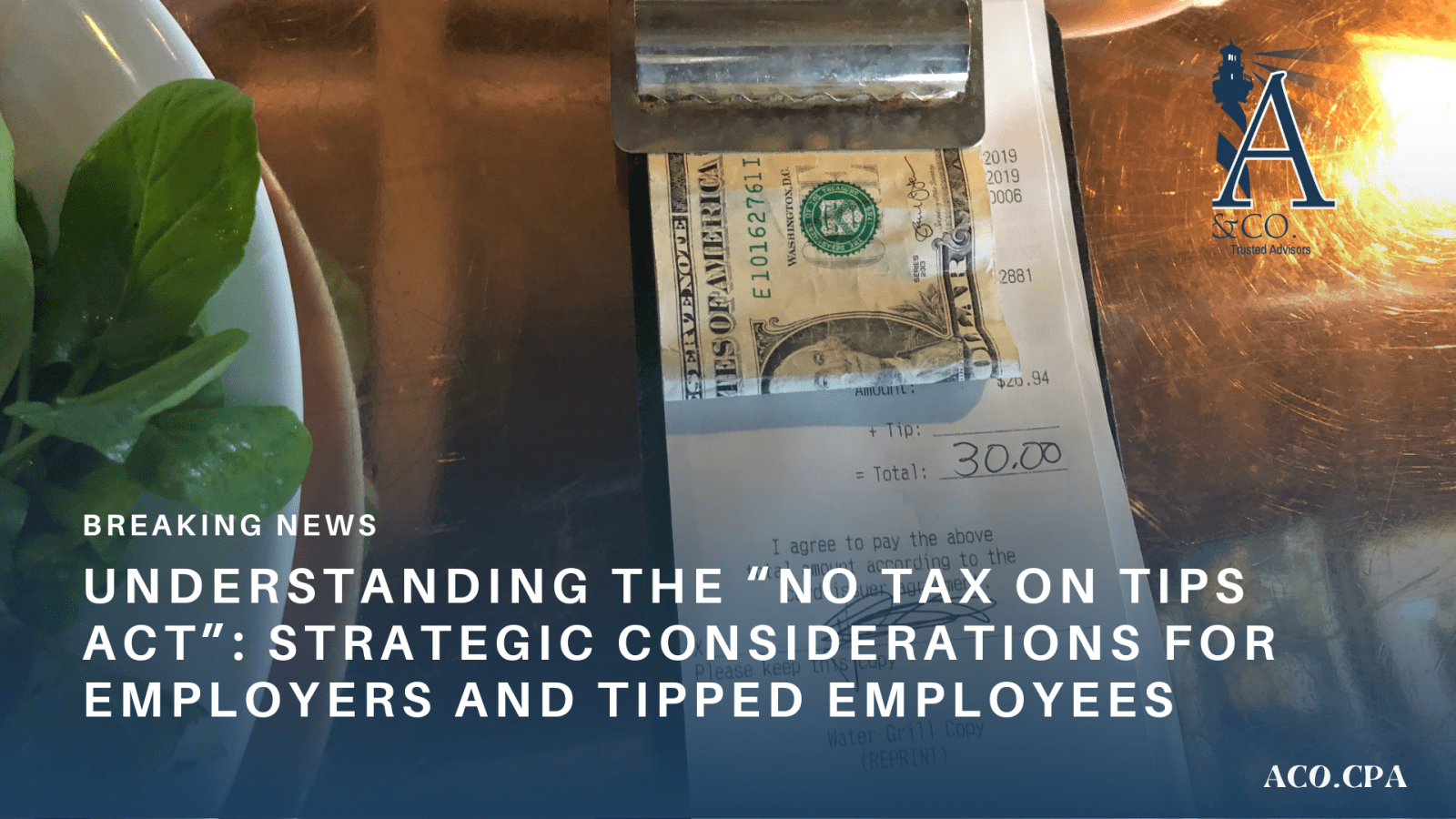On May 20, 2025, the U.S. Senate passed the No Tax on Tips Act (S.129) with unanimous bipartisan support. Now under review in the House of Representatives, this legislation seeks to exempt up to $25,000 in reported tip income from federal income tax, while expanding employer tax credits on payroll taxes associated with those tips.
For clients operating in the restaurant, hospitality, beauty, and service industries, the bill could have significant financial and compliance implications. Below, we break down the key provisions, benefits, and considerations to help you prepare for what may soon become law.
Key Provisions of the No Tax on Tips Act
- Tax Deduction for Tipped Employees
Under the proposed law, eligible employees will be able to deduct up to $25,000 annually in qualified tips from their federal taxable income. This deduction applies to:
- Cash tips
- Tips received via credit/debit cards
- Digital payments (e.g., Venmo, PayPal, Square)
The only requirement is that these tips must be properly reported to the employer, which will ensure that they are subject to payroll tax and tracked for deduction eligibility.
Client Impact: Employers must ensure tip reporting systems are robust, accurate, and up-to-date. Inaccurate reporting could disqualify employees from the deduction and expose businesses to compliance risks.
- Eligibility Thresholds
To qualify for the deduction, employees must:
- Work in a customarily tipped occupation, such as food servers, bartenders, hair stylists, barbers, estheticians, or spa attendants.
- Have an Adjusted Gross Income (AGI) of $160,000 or less in the preceding tax year.
This provision ensures that the benefit targets middle- and lower-income workers, who are more likely to rely on tips as a core part of their income.
Client Impact: Employers should begin identifying which of their employees are likely to fall under the qualifying income threshold. This could inform internal HR planning, end-of-year compensation discussions, and tax preparation strategies for both the business and its staff.
- Expanded FICA Tip Credit for Employers
Historically, the FICA tip credit has only been available to employers in the food and beverage industry. The new bill proposes to expand this credit to include the personal care sector, encompassing:
- Hair salons
- Barbershops
- Nail salons
- Spas and esthetics businesses
Employers would receive a credit for the employer share of payroll taxes (Social Security and Medicare) paid on qualified tip income, creating a direct incentive to improve compliance and reporting.
Client Impact: This expansion is particularly relevant for beauty and personal service businesses, which have not previously benefited from this tax provision. If passed, it could lower overall tax liability and encourage broader adoption of tip reporting systems in these industries.
Strategic Implications for Our Clients
- Hospitality, Restaurant, and Food Service
This bill could significantly improve employee take-home pay, boosting morale and potentially easing staffing shortages in an industry still recovering from pandemic-era disruptions. Employers who prioritize transparency in tip reporting and invest in compliant POS systems will be well positioned to take full advantage of the new tax environment.
- Salons, Barbershops, and Personal Care Services
For the first time, these businesses will be able to claim payroll tax credits on reported tips. This not only provides direct tax savings but also incentivizes formal reporting, which could lead to improved financial tracking and business valuation metrics for long-term growth or sale.
- Small Business Owners and Franchise Operators
This legislation adds another layer to existing tax and labor compliance requirements. Business owners should consider conducting a compliance audit of their tip-reporting practices and updating their employee education materials to reflect the new potential benefits of properly reporting tip income.
Cautions and Considerations
Despite its bipartisan popularity, there are important factors to weigh before acting on the proposed legislation:
- Marginal Benefit for Low-Income Workers: Many tipped employees already pay little to no federal income tax. For these individuals, the deduction may not translate into significant savings—especially when weighed against the cost of payroll tax withholding.
- Wage Structuring Risks: Employers must take care not to restructure base wages in an attempt to reclassify compensation as “tips.” Doing so could violate labor laws, compromise employee benefits eligibility, and invite scrutiny from the IRS or Department of Labor.
- Federal Revenue Impact: The Joint Committee on Taxation estimates the bill could reduce government revenues by $10–15 billion annually. Depending on the broader political climate, the bill could be subject to modification, sunset provisions, or phased implementation.
- Unresolved Wage Equity Issues: Critics argue that focusing on tip tax relief distracts from broader wage equity debates, including calls to eliminate the federal subminimum wage for tipped workers. Businesses should continue to monitor both state and federal wage law developments in tandem.
Recommended Next Steps
While the No Tax on Tips Act is not yet law, businesses can prepare now by taking proactive steps:
- Review your payroll systems and POS platforms to ensure accurate, traceable tip reporting.
- Educate your employees on the importance of reporting tips for their own tax benefit.
- Analyze your employee compensation structure to confirm compliance with wage laws while maximizing tax efficiency.
- Engage your tax advisor to model potential savings and discuss implementation strategies if the bill is enacted.
We’re Here to Help
As the bill continues to move through Congress, our firm is committed to keeping you informed and equipped to make smart decisions. Whether you’re a small business owner, a restaurant group operator, or a salon franchisee, our tax and compliance teams can provide tailored advice on how to leverage upcoming changes for long-term value.
To schedule a consultation or request a custom impact assessment, please contact us.



